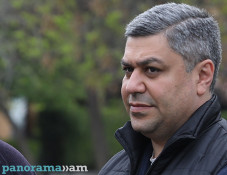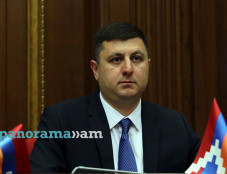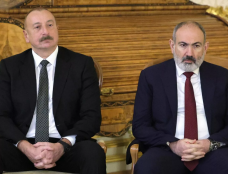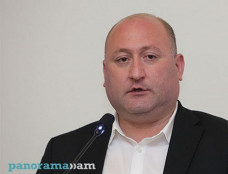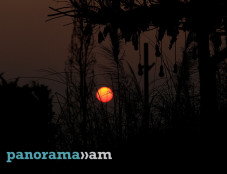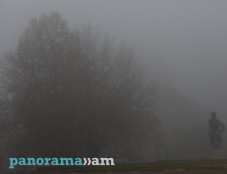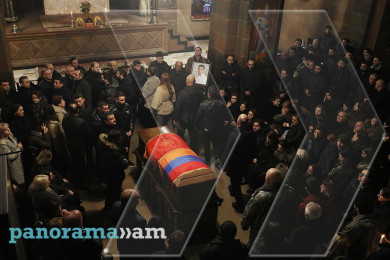
Daily Mail: Ahead of Eurovision, Azerbaijani singers leave the country to survive
“125 million people will watch Engelbert Humperdinck at this month’s Eurovision Song Contest. But will any of them be rooting for the host nation, which tortures its own people and has one of the worst human rights records in Europe?” says the popular British newspaper “Daily Mail.”
The article notes that the 24 y.o. Azerbaijani rapper Jamal Ali was arrested with his bass guitarist, Natiq Kamilov, 24, while playing at an opposition demonstration in Azerbaijan. The two were badly beaten by the police, sentenced to ten days in jail and tortured.
“They tortured me twice. In the court and police station they just hit me. The proper beating was in jail. They called it lessons,” Ali says, adding that he had two courses, the first one lasted almost three hours, the second was about two hours, and he was handcuffed, with his hands behind him, and placed on a chair. “They put another chair in front of me and put my feet on it. A huge policeman sat on my knees so I couldn’t move. Another beat my feet. Another asked, “Why don’t you like this? Do you still think you don’t like the President?” If you say yes, they beat you more. I said, “I’m just a musician, let me out. I’ve nothing to do with the opposition.” They beat me on my heels so I couldn’t walk to another protest,” says Jamal Ali.
This is a far cry from the sequins of the Eurovision Song Contest, and yet Azerbaijan is hosting this year’s show, “Daily Mail” writes, noting that it’s claimed that the country's government has spent over $1 billion preparing for Eurovision, which it wants to be a showcase for the nation. Noteworthy, that while in London to promote her song, 'When the Music Dies', Azerbaijan's 2012 Eurovision entry Sabina Babayeva - daughter of a high-ranking Azerbaijani army officer – said that Azerbaijan is a very good place for musicians and they are strongly against human rights violations.
In fact, Azerbaijan has one of the worst human rights record of any country in the Council of Europe. Musicians, journalists, and the gay community have all borne the brunt of the repression, the British publication notes, adding that ironically, Engelbert Humperdink’s Eurovision song is called “Love Will Set You Free,” but it won’t in Azerbaijan.
“Visitors arrive at Heydar Aliyev International Airport, just one of dozens of public buildings named after the former president, who was once the head of Azerbaijan’s KGB. His son Ilham Aliyev took over on his death in 2003. In the most recent parliamentary elections, in 2010, not a single MP from either the two opposition parties, Azerbaijan Popular Front or Musavat, won a seat,” “Daily Mail” writes, noting that the Aliyevs like to demonstrate their power, and armed police are a constant presence on the streets.
The most active dissidents are intimidated with threats of prison and torture, and family members can be fired from their jobs. For the past seven years, the government has banned any opposition rallies, however, in the run up to Eurovision, two official demonstrations were allowed on the outskirts of Baku, although most Azerbaijanis assume that after the contest rallies will be banned again.
Jamal Ali is not the only one to suffer. After being released from prison, his bass guitarist, Natiq Kamilov, has been press-ganged into the army. “It’s completely illegal. He’s a student. He’s exempt from military service. But he was called down to the army office and taken away,” says Ali, who's afraid for Kamilov’s life as there are a lot of unexplained casualties in Azerbaijani army every year. Jamal Ali thinks Eurovision is the only reason he’s still free. “'I think I am probably going to leave the country. I don’t want to die at 24,” the musician said.
Azer Mammadov, another singer, fled to Holland with his wife and baby daughter last year because of government harassment as his songs criticise the regime. His concerts were frustrated by the presidential administration, he couldn’t find any place to perform, his family was being watched, and after his daughter was born, Mammadov decided to leave Azerbaijan.
Well-known Azerbaijani blogger Emin Milli is one of the authors of video mocking the government for buying two donkeys from Germany for €42,000, which, Ali thinks, was just another example of government corruption. Emin Milli was sentenced to two years in jail for posting the video, and after his arrest, Milli’s father-in-law was fired from his job and Milli’s own marriage collapsed. Milli, who now studies in London, notes the government keeps people in uncertainty, they punish one activist, but not another - to scare the middle class of a whole generation.
“Daily Mail” notes that Milli is not being melodramatic. Elmar Huseynov, a magazine editor, was shot outside his apartment in 2005 and his killers have still not been found. In November 2011 another prominent journalist, Rafic Tagi, was stabbed to death in the streets of Baku and no one has been arrested for that crime either. Last April, prominent Azerbaijani journalist Idrak Abbasov was brutally beaten up by security guards of the State Oil Company of Azerbaijan because he was filming people being forcibly evicted from their homes on the outskirts of Baku.
Another journalist, Khadija Ismailova, who has been looking into links between the Eurovision construction boom and the Aliyev, was subjected to blackmail, which, she thinks, was sanctioned by the government. Ismailova was sent intimate photographs in an envelope with a note saying she will be defamed if she won't stop her investigations. A week later, a video appeared on a website that showed Ismailova making love with a boyfriend. “I knew the film had been taken the previous summer and knew what angle it had been taken from, so we took the ceiling apart and found the wires in the ceiling,” says Ismailova, noting that she managed to track down the telecommunications company employee who had installed the cameras.
“A lot of our activity in Azerbaijan happens online. Much more than in reality. Our government can control reality very well so we have all escaped to the virtual world,” says Ismailova. Jamal Ali says Internet the only place they can be free, but if things get more serious the government will probably ban the Internet too. “They want to be kings and queens and we are slaves. That’s why they get surprised when a slave sings a song,” says Ali.
Newsfeed
Videos





